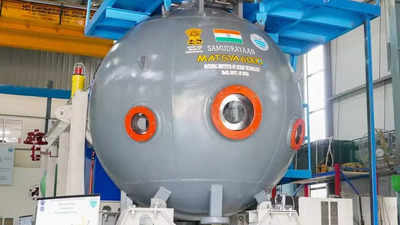Deep Ocean mission ‘Samudrayaan’ gets Rs 600cr budget boost
TNN | Feb 3, 2025, 03.18 AM IST

NEW DELHI: In a big boost for India's ambitious Deep Ocean Mission, Union finance minister Nirmala Sitharaman has allocated Rs 600 crore for the Samudrayaan project, under which scientists will be sent to the depths of the ocean in a specially-designed submersible to explore the ocean floor, including the country’s continental shelf and exclusive economic zones.
The earth sciences ministry, which is spearheading the mission, received an allocation of Rs 3,649.8 crore in the budget, presented on Saturday, as against Rs 3,064.8 crore in the ongoing fiscal year. India plans to send a manned-submersible, developed by the Chennai-based National Institute of Ocean Technology (NIOT), up to a depth of 500 metres in the ocean later this year, and gradually explore the seabed at the depth of 6,000 metres next year.
The mission involves mapping of floors of deep oceans and development of technologies like a manned submersible, mining system for deep sea mining, sustainable utilisation of deep-sea bioresources, and developing engineering designs for offshore thermal energy-driven desalination plants. Human capacity will be developed in ocean biology and engineering through the translation of research into industrial applications.
The Deep Ocean Mission aims to explore deep-oceanic resources and develop technologies for their sustainable use. The mission consists of six major themes, namely development of technologies for deep sea mining, manned submersible, and underwater robotics; development of ocean climate change advisory services; technological innovations for exploration and conservation of deepsea biodiversity; deep ocean survey and exploration; energy and freshwater from the ocean; and advanced marine station for ocean biology.
The minister also allocated Rs 1,329 crore for Mission Mausam. In the last revised budget of 2024-25, the mission was allocated Rs 671 crore, thus doubling the outlay this time. This is an ambitious initiative by the earth sciences ministry designed to enhance India's weather and climate forecasting capabilities across various critical sectors, including agriculture, aviation, urban planning, defence, sports, and disaster preparedness.
The mission seeks to leverage cutting-edge technologies, high-performance computing, and advanced modelling techniques to revolutionise weather monitoring, prediction, and data analysis. By advancing weather surveillance, incorporating next-generation radars and satellites, and utilising artificial intelligence and machine learning, Mission Mausam aims to provide more accurate and timely forecasts, addressing the challenges of extreme weather events and climate change.
The earth sciences ministry, which is spearheading the mission, received an allocation of Rs 3,649.8 crore in the budget, presented on Saturday, as against Rs 3,064.8 crore in the ongoing fiscal year. India plans to send a manned-submersible, developed by the Chennai-based National Institute of Ocean Technology (NIOT), up to a depth of 500 metres in the ocean later this year, and gradually explore the seabed at the depth of 6,000 metres next year.
The mission involves mapping of floors of deep oceans and development of technologies like a manned submersible, mining system for deep sea mining, sustainable utilisation of deep-sea bioresources, and developing engineering designs for offshore thermal energy-driven desalination plants. Human capacity will be developed in ocean biology and engineering through the translation of research into industrial applications.
The Deep Ocean Mission aims to explore deep-oceanic resources and develop technologies for their sustainable use. The mission consists of six major themes, namely development of technologies for deep sea mining, manned submersible, and underwater robotics; development of ocean climate change advisory services; technological innovations for exploration and conservation of deepsea biodiversity; deep ocean survey and exploration; energy and freshwater from the ocean; and advanced marine station for ocean biology.
The minister also allocated Rs 1,329 crore for Mission Mausam. In the last revised budget of 2024-25, the mission was allocated Rs 671 crore, thus doubling the outlay this time. This is an ambitious initiative by the earth sciences ministry designed to enhance India's weather and climate forecasting capabilities across various critical sectors, including agriculture, aviation, urban planning, defence, sports, and disaster preparedness.
The mission seeks to leverage cutting-edge technologies, high-performance computing, and advanced modelling techniques to revolutionise weather monitoring, prediction, and data analysis. By advancing weather surveillance, incorporating next-generation radars and satellites, and utilising artificial intelligence and machine learning, Mission Mausam aims to provide more accurate and timely forecasts, addressing the challenges of extreme weather events and climate change.